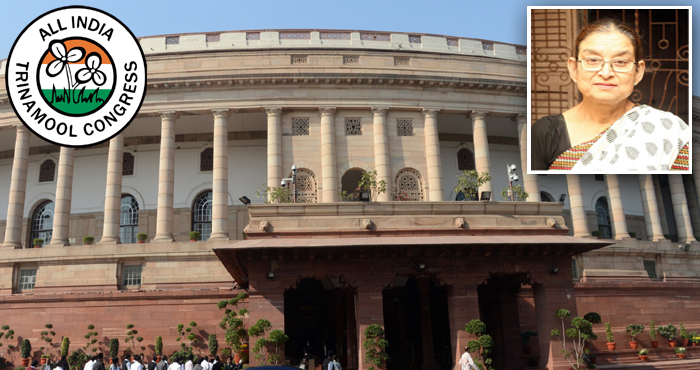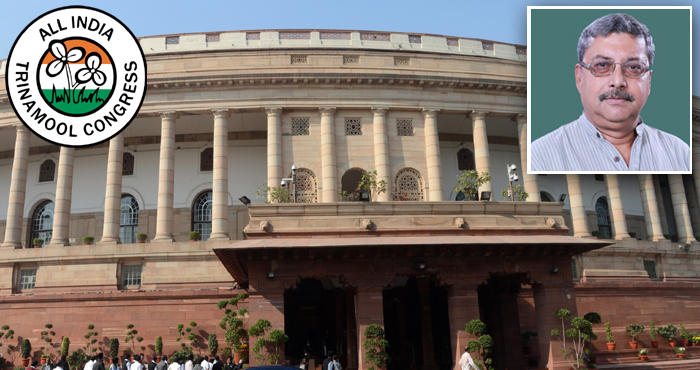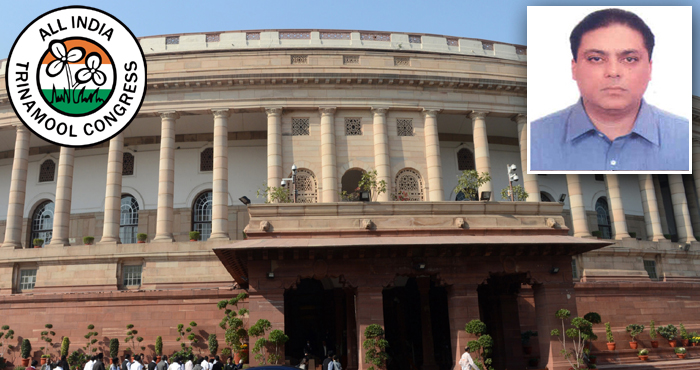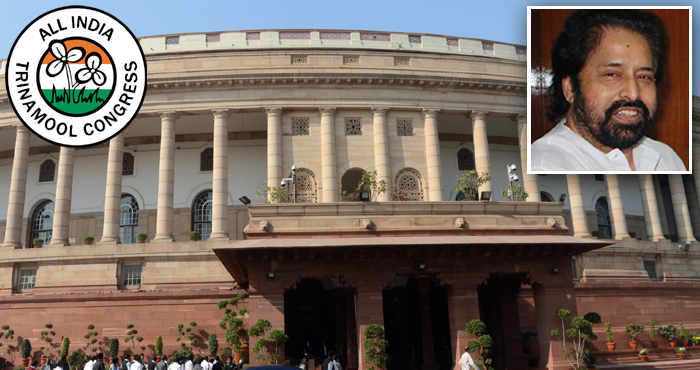Bengal Chief Minister Mamata Banerjee addressed a public meeting at the Alorani ground at Chopra in Uttar Dinajpur district today after inaugurating and laying the foundation stones of a bouquet of developmental projects for the district.
Among the projects inaugurated were government buildings, boys’ hostels, water supply projects and a statue of Rai Saheb Thakur Panchanan Barma.
She laid the foundation stones of projects like a medical college and hospital in Raiganj, two power sub-stations, government buildings, housing projects, road projects and hostels for boys and girls.
She also distributed benefits under Sabuj Sathi, Siksha Shree, Geetanjali and other schemes.
Salient points of Mamata Banerjee’s speech:
Congratulations to everyone for making Kanyashree a success. I always thank those who who work for the people. All of us must work together to make the schemes of the Bengal Government a success.
People are in a lot of distress. The price of LPG cylinder is being increased. Distribution of sugar and kerosene through ration shops is being stopped. It is the social obligation and duty of the Central Government to provide subsidy to the people, using the taxpayers’ money.
The Centre is taking away Rs 40,000 crore per year as debt repayment. Despite that, we are continuing our social obligations like free treatment in State Government hospitals, schemes for Adivasis, minorities and backward castes, and giving 40 lakh bicycles under Sabuj Sathi Scheme. There are plans for giving 30 lakh more bicycles this year..
To the Centre: You are increasing the prices of essential commodities. You are decreasing the interest rate of savings bank accounts; so do you want people to invest in chit funds? Try to do things in such a way that people are not forced to invest in chit funds. You just come from Delhi, indulge in big talk, incite riots and go back.
You need to help the administration. It is not the common people, but political leaders from outside who create trouble. They start the trouble and then run away, never to come back. But we need to remain united.
We don’t indulge in activities like Beti Bachao, Beti Padhao programme, which is only about publicity. We have spent Rs 5,000 crore to implement the Kanyashree Scheme. We want our ‘kanyashrees’ to conquer the world. We are giving the newborns saplings as part of the Sabuj Shree Scheme.
Tea garden workers are not getting food. Schools and colleges are closed. Tourism is in the doldrums. The mark of success for any movement is being able to help the people. Let all political parties be united – let the Hills return to normalcy. Our Government will do whatever is necessary. But we won’t do any such thing that would involve violence. We love the Hills.
We can give our lives for the sake of unity in the State. Our responsibility is to protect the unity of the nation. They (Central leaders) are creating a divide between the Hindus and the Muslims. Our fight for the people will continue. I want the tea gardens to open. I want peace to return to the Hills. I want the people’s problems to be solved. Keep the Hills in good health.
Keep the peace. If you see anyone destroying peace, inform the administration. Being late in taking action leads to a lot of problems. Help the common people.
Polytechnic colleges, medical colleges, ITIs, minority bhavans and new police stations have come up. Roads have been built and repaired. As part of Lok Prasar Prakalpa, 82,000 artistes are being given financial aid. We have exempted farmers from repaying their debts. What we can do, nobody can.
There are some people who are solely indulging in making mischief and inciting riots. We don’t want riots, we want peace. We don’t want to die, we want to live. There would be nothing to gain from inciting riots, and we never do and never will support riots.
Bengal will hold its head high. Do not be scared of anyone. I will never stop speaking against atrocities. I will speak up again and again if people are in trouble. We have the capacity to counter any storm because we have Maa-Mati-Manush with us.
শান্তি বজায় রাখুন, দাঙ্গা লাগাবেন নাঃ মমতা বন্দ্যোপাধ্যায়
আজ উত্তর দিনাজপুরের চোপরা’য় একটি জনসভা’য় বক্তব্য রাখেন বাংলার মুখ্যমন্ত্রী মমতা বন্দ্যোপাধ্যায়। চোপরা’র আলোরানি মাঠ থেকে একগুচ্ছ উন্নয়নমূলক প্রকল্পের শিলান্যাস করেন তিনি।
সরকারি ভবন, ছাত্রাবাস, জল সরবরাহ প্রকল্প ও রাই সাহেব ঠাকুর পঞ্চানন বর্মার একটি মূর্তি’র উন্মোচন করেন। রায়গঞ্জের মেডিক্যাল কলেজ, ২টি ইলেকট্রিক সাব স্টেশন, সরকারি ভবন, আবাসন প্রকল্প, সড়ক প্রকল্প, ছাত্রাবাস ও ছাত্রীনিবাসের শিলন্যাস করেন। সবুজ সাথীর সাইকেল, শিক্ষাশ্রী, গীতাঞ্জলী পরিষেবা প্রদান করেন।
মমতা বন্দ্যোপাধ্যায়ের বক্তব্য প্রধান আংশঃ
সকলকে অভিনন্দন জানাচ্ছি। আমার কন্যাশ্রীদের অভিনন্দন। যারা মানুষের কাজ ভালবাসে তাদের আমি সব সময় ধন্যবাদ জানাই। মা-মাটি-মানুষ আমাদের গর্ব। আমরা সবাই মিলে একসাথে আমাদের কর্মসূচী পালন করি। পশ্চিমবঙ্গ সরকার সকলের জন্য কাজ করে।
মানুষ অনেক দুঃখে আছে। এল পি জি গ্যাসের ভরতুকি তুলে দেওয়া হচ্ছে। চিনি, কেরোসিন বন্ধ করে দেওয়া হচ্ছে। জনগণের টাকায় তাদের ভরতুকি দেওয়া হয়। এটা সরকারের সামাজিক ন্যায়, দায়বদ্ধতা, কর্তব্য। গরীব মানুষরা সবচেয়ে বেশি ক্ষতিগ্রস্ত।
আমাদের কাছ থেকে ৪০ হাজার কোটি টাকা কেটে নিয়ে যাচ্ছে। তাও আমরা বিনামূল্যে চিকিৎসা দিই। আদিবাসী, সংখ্যালঘু, পিছিয়ে পড়া মানুষ সকলকে আমরা সমান ভাবে পরিষেবা দিই। এক বছরে ৪০ লক্ষ সবুজ সাথী সাইকেল দিয়েছি, এই বছরে আরও ৩০ লক্ষ সাইকেল দেব।
সব জিনিসের দাম বাড়িয়ে দিচ্ছে। ব্যাঙ্কের সুদের হার কমিয়ে দিচ্ছে, তাহলে কি মানুষ চিট ফান্ডে যাবে? মানুষ যাতে চিট ফান্ডে না গিয়ে ব্যাঙ্কে যায় সেই চেষ্টা করুন। কিন্তু আপনারা তা করেন না। দিল্লি থেকে এসে বড় বড় কথা বলেন, আর দাঙ্গা লাগিয়ে ফিরে যান।
প্রশাসনকে সাহায্য করতে হবে। মানুষ নয়, গণ্ডগোল করে কিছু বাইরের রাজনৈতিক নেতা। বাইরে থেকে গুন্ডা নিয়ে এসে মদত দেয়। আমি চাই সকলে ভালো থাকুক। গণ্ডগোল লাগিয়ে ওরা পালিয়ে যায়, আর দেখা যায় না। কিন্তু আমাদের একসঙ্গে থাকতে হবে।
আমরা বেটি বাঁচাও বেটি পড়াও এর মত activities করি না। শুধু পাবলিসিটি করছে। আমরা কন্যাশ্রী ৫০০০ কোটি টাকা খরচ করেছি। আগামী দিনে স্কুল কলেজ বিশ্ববিদ্যালয়ের ছাত্রীরাও এই প্রকল্পের সুবিধা পাবে। আমরা চাই আমাদের কন্যাশ্রীরা বিশ্ব জয় করে। নবজাতকদের আমরা গাছ দিচ্ছি সবুজশ্রী প্রকল্পের আওতায়।
আজ চা বাগানের শ্রমিকরা খাবার পাচ্ছেন না। চা বাগান, স্কুল-কলেজ সব বন্ধ। পর্যটন, হোটেল সব বন্ধ। মানুষের জন্য কাজ করা যে কোন আন্দোলনের সবচেয়ে সফলতা। সব রাজনৈতিক দল একসাথে থাকুক, পাহাড় স্বাভাবিক জীবনে ফিরে আসুক। আমাদের সরকার যা করার করবে, হিংসা হয় এমন কিছু করি না আমরা, আমরা পাহাড়কে ভালোবাসি। পাহাড় আমাদের একটা অংশ।
আমরা জীবন দিয়ে দেব, কিন্তু ভাগ হতে দেব না। সব মানুষ দেশের সম্পদ। দেশকে রক্ষা করা আমাদের পরম্পরা। রাজনৈতিক স্বার্থে ওরা হিন্দু-মুসলমানদের মধ্যে ভাগ করছে। সকল মানুষের জন্য আমাদের লড়াই চলবে। আমি চাই চা বাগানগুলি যাতে খুলে যায়, পাহাড়ে শান্তি বজায় থাকে, মানুষের সমস্যার সমাধান হোক। পাহাড়কে ভালো রাখুন।
মিলেমিশে কাজ করুন। শান্তি বজায় রাখুন। কেউ অশান্তি করতে চাইলে প্রশাসনকে সঙ্গে সঙ্গে সতর্ক করুন। দেরিতে action নিলে অনেক সমস্যা হয়। মানুষের সাথে থাকুন।
এখানে পলিটেকনিক কলেজ, মেডিকেল কলেজ, আই টি আই কলেজ, মাইনরিটি ভবন, রাস্তা সংস্কার, পুলিশ স্টেশন তৈরি হয়েছে। লোক প্রসার প্রকল্পের আওতায় ৮২ হাজার শিল্পীকে আনা হয়েছে। এদের সরকার থেকে সাহায্য করা হয়। আমরা কৃষকদের ঋণ মুকুব করে দিয়েছি। আমরা যা করতে পারি, আর কেউ তা পারে না।
কিছু লোক অকাজ করে, দাঙ্গা লাগায়। আমরা দাঙ্গা চাই না শান্তি চাই। মৃত্যু চাই না, জীবন চাই। দাঙ্গা লাগিয়ে কোন লাভ হবে না, আমরা কখনো দাঙ্গা সমর্থন করি না, করব না।
এই বাংলা সম্মানের সঙ্গে মাথা উঁচু করে বাঁচবে, কাউকে ভয় পাবেন না। আমি কখনো আমার মুখ বন্ধ করব না। এটা আমার অভ্যাস। মানুষ বিপদে পড়লে হাজার বার বলব। যে কোন ঝড়কে প্রত্যাঘাত করার শক্তি আমাদের আছে কারণ মা-মাটি-মানুষ আমাদের ভরসা।








